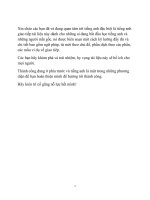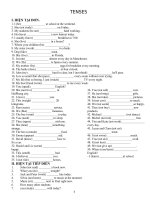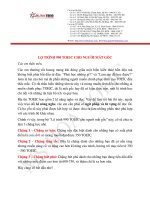Speaking a1 a2 dành cho người mất gốc
Bạn đang xem bản rút gọn của tài liệu. Xem và tải ngay bản đầy đủ của tài liệu tại đây (1014.49 KB, 34 trang )
Speaking: A1
Checking understanding
In this video, Paul has problems understanding Bob. Listen to the language they use for
checking understanding and practise saying the useful phrases.
Before watching
Do the preparation task first. Then watch the video and do the exercises.
Preparation task
Put the words and phrases in order to make sentences.
1. sorry.
I’m
2. very well.
3. that
hear you
Could
4. don’t
say
understand.
5. more slowly,
6. you
7. Is
Do
it?
8. that’s
Can
I can’t
again, please?
you
I
please?
the hammer?
that
you repeat
mean
this
Yes,
right!
Tasks
Task 1
Are the sentences true or false?
1.
2.
3.
4.
5.
6.
Bob wants the hammer.
Paul is ill.
The hammer is in the toolbox.
The hammer is on the right.
Paul gives Bob the scissors.
Paul thinks Bob spoke clearly.
© British Council 2020
Answer
True
True
True
True
True
True
False
False
False
False
False
False
www.britishcouncil.org/learnenglish
1
Task 2
Complete the dialogue with words from the box.
repeat
slowly
this
right
hear
sorry
understand
mean
well
Bob: Excuse me, Paul, could you pass me the hammer?
Paul: I’m (1)……………………………… , Bob, my ears are blocked. I can’t (2)……………………………… you very
(3)………………………………… . Could you say that again, please?
Bob: The hammer. Please could you pass it to me?
Paul: Sorry, Bob, I don’t (4)……………………………… .
Bob: No, Paul – I need the hammer. It’s in the toolbox, on the left, under the scissors.
Paul: Sorry, Bob. Can you (5)……………………………… that more (6)……………………………… , please?
Bob: The hammer ... in the toolbox ... on the left ... under the scissors.
Paul: On the left ... under the scissors ... Ah! Do you (7)……………………………… the hammer? Is
(8)……………………………… it?
Bob: Yes, that’s (9)……………………………… !
Task 3
Complete the dialogue.
Receptionist: (Phone ringing) Good morning.
Caller: Good morning. Is Noelia there, please?
Receptionist: I’m (1)……………………………… . I can’t (2)……………………………… you very well.
Caller: Noelia. I have a package for her. I’m in a van in the street.
Receptionist: I’m sorry. Could you (3)………………………………… that (4)……………………………… , please?
Caller: I’m in a van. I’ve got a package for Noelia.
Receptionist: Ah! OK. You can park here. The code is 367HGV57.
Caller: OK. Do you (5)……………………………… the company car park?
Receptionist: Yes.
Caller: OK. Sorry, can you (6)……………………………… the code more (7)……………………………… , please?
Receptionist: Yes, sorry! 3 ... 6 ... 7 ... H ... G ... V ... 5 ... 7.
Caller: OK. 367 ... HGV ... 57?
Receptionist: Yes, that’s (8)……………………………… !
Discussion
Did you find the video useful?
© British Council 2020
www.britishcouncil.org/learnenglish
2
Transcript
Ana: Hi, I’m Ana. Welcome to What to Say!
Do you know what to say when you want to check your understanding? Listen out for useful
language for checking your understanding. Then, we’ll practise saying the new phrases – after
this.
Bob: This isn’t right. Hey! Excuse me, Paul, could you pass me the hammer?
Paul: Sorry, Bob, my ears are blocked. I can’t hear you very well. Could you say that again,
please?
Bob: The hammer. Please could you pass it to me?
Paul: The spanner?
Bob: No. The hammer!
Paul: Sorry, Bob, I don’t understand. This is the spanner!
Bob: No, Paul, I need the hammer. It’s in the toolbox, on the left, under the scissors.
Paul: Sorry, Bob. Could you repeat that more slowly, please?
Bob: The hammer … in the toolbox … on the left … under the scissors.
Paul: On the left … under the scissors … Oh! Do you mean the hammer? Is this it?
Bob: Yes, that’s right!
Paul: Ah! Why didn’t you say so?
Bob: I did!
Ana: Hello again! Oh dear. I think Paul needs to go home and sleep. So, did you notice the
useful phrases used for checking your understanding? Listen to me and then repeat.
I’m sorry?
I can’t hear you very well.
Could you say that again, please?
I don’t understand.
Can you repeat that more slowly, please?
Do you mean the hammer?
Is this it?
Yes, that’s right!
Ana: Try and use some of these phrases the next time you want to check your understanding
in English. Bye for now!
© British Council 2020
www.britishcouncil.org/learnenglish
3
Speaking: A1
Making suggestions
In this video, Noelia and Yuna have a very good meeting. Listen to the language they use for
making suggestions and practise saying the useful phrases.
Before watching
Do the preparation task first. Then watch the video and do the exercises.
Preparation task
Decide which five sentences are suggestions.
a. Shall we go to Italy this summer?
b. Why don’t you ask Jack to help you?
c. How about starting the meeting with coffee and cakes?
d. Let’s finish this project first.
e. You must do that today.
f. He works four days a week.
g. It’s important to enjoy your job.
h. Do you want to help me finish this project?
Tasks
Task 1
Decide which sentence gives the best summary of the video.
a. Yuna and Noelia have a long meeting and don’t make any decisions.
b. Yuna and Noelia share lots of ideas and work very well in a short meeting.
c. Yuna and Noelia both get phone calls during the meeting.
© British Council 2020
www.britishcouncil.org/learnenglish
4
Task 2
Put the words and phrases in order to make sentences.
1. starting
about
2. for next month.
3. to make
6. you
go for
need
4. to help you?
5. we
We’ll
Why
present it
Can
with
social media?
Let’s
see it first?
20 per cent
some extra help
don’t
Shall
How
ask Vanya
at the
it work.
you
next team meeting?
let Paul
Task 3
Put the phrases (a–h) into the correct groups (1–2).
1. Positive
…………………………………
2. Negative
…………………………………
a.
b.
c.
d.
e.
f.
g.
h.
Agreed, good idea.
No, I don’t think so.
It’s going to be difficult.
Yeah, sure.
Good plan.
No, I don’t think that’s a good idea.
OK, no problem.
I’m not really sure.
Discussion
Do you ever switch off your mobile phone to help you focus?
© British Council 2020
www.britishcouncil.org/learnenglish
5
Transcript
Ana: Hi! I’m Ana. Welcome to What to Say!
Do you know what to say when you make suggestions? Listen out for useful language for
making suggestions. Then, we’ll practise saying the new phrases – after this!
Yuna: OK, this time let’s focus. Phones off.
Noelia: Yes, and in my bag!
Yuna: Ready?
Noelia: I’m ready.
Yuna: We have half an hour.
Noelia: OK, let’s go!
Yuna: How about starting with social media?
Noelia: Sure. Engagement is up 15 per cent this month.
Yuna: Good. So let’s go for 20 per cent for next month.
Noelia: Yeah, sure. I’ll tell the team. We’ll need some extra help to make it work.
Yuna: Agreed. Good idea.
…
Yuna: Why don’t you ask Vanya to help you create a new social media plan?
Noelia: OK, no problem. Shall we present it at the next team meeting together?
Yuna: Good plan. Can you let Paul see it first?
Noelia: Sure, I’ll do that.
Yuna: Anything else?
Noelia: No, that’s it.
Yuna: And that’s half an hour! We did it!
Noelia: We’re really good at this!
Ana: Hello again! Wow, that was a good meeting! So, did you notice the useful phrases used
for making suggestions? Listen to me and then repeat.
Let’s focus.
How about starting with social media?
Yeah, sure.
© British Council 2020
www.britishcouncil.org/learnenglish
6
We’ll need some extra help.
Agreed. Good idea.
Why don’t you ask Vanya?
OK, no problem.
Shall we present it at the meeting?
Good plan.
Ana: Try and use some of these phrases the next time you make suggestions in English. Bye
for now!
© British Council 2020
www.britishcouncil.org/learnenglish
7
Speaking: A1
Meeting new people
In this video, Vanya meets Emir and Yuna. Listen to the language they use for meeting new
people and practise saying the useful phrases.
Before watching
Do the preparation task first. Then watch the video and do the exercises.
Preparation task
Put the words in the correct order to make sentences.
1. Vanya.
2. I
You
Yes,
3. Nice
be
must
am.
you.
to
4. journey?
How
5. It’s
be
to
6. is
This
meet
your
great
was
here!
Vanya.
7. I’m
Hi,
Yuna.
8. the
to
Welcome
team!
Tasks
Task 1
Are the sentences true or false?
1.
2.
3.
4.
5.
6.
Paul meets Vanya when she arrives.
Emir offers to show Vanya the office.
Vanya had a bad journey.
Vanya is happy to be at the office.
Emir offers Vanya a glass of water.
Emir introduces Vanya to Yuna.
© British Council 2020
Answer
True
True
True
True
True
True
False
False
False
False
False
False
www.britishcouncil.org/learnenglish
8
Task 2
Write a number (1–9) to put the sentences in the correct order.
It was fine and it’s great to be here!
Are you Paul?
No, I’m not. I’m Emir. You must be Vanya.
Ah, Yuna, this is Vanya.
Yes, I am! Nice to meet you.
Perfect. Thanks.
Hi, I’m Yuna. Nice to meet you – welcome to the team!
So how was your journey?
You too. Can I show you the office?
Task 3
Complete the dialogue.
Omar: Hi. (1)……………………………… you Gabriella?
Anna: No, (2)……………………………… not. But she asked me to meet you. I’m Anna. You
(3)……………………………… be Omar.
Omar: Yes, I am! Nice to (4)……………………………… you.
Anna: You (5)……………………………… . Can I show you the school?
Omar: Perfect. (6)……………………………… .
Anna: So (7)……………………………… was your journey?
Omar: It (8)……………………………… OK, thanks.
Anna: Ah, Matt, (9)……………………………… is Omar.
Matt: Hi, I’m Matt. Nice to meet you, Omar. (10)……………………………… to the class!
Discussion
Do you like meeting new people?
© British Council 2020
www.britishcouncil.org/learnenglish
9
Transcript
Ana: Hi! I’m Ana. Welcome to What to Say!
Do you know what to say when you meet new people? Listen out for useful language for
meeting new people. Then, we’ll practise saying the new phrases – after this.
Vanya: Hi.
Emir: Hello.
Vanya: Are you Paul?
Emir: No, I’m not. But he asked me to meet you. I’m Emir. You must be Vanya.
Vanya: Yes, I am. Nice to meet you.
Emir: You too. Can I show you the office?
Vanya: Perfect. Thanks.
Emir: So how was your journey?
Vanya: It was fine and it’s great to be here!
Emir: Well, it’s great to have you here. Can I get you a coffee?
Vanya: Oh, yes, please.
Emir: Ah, Yuna, this is Vanya.
Yuna: Oh, hi, I’m Yuna. Nice to meet you. Welcome to the team!
Ana: Hello again! That went well. OK, did you notice the useful phrases used for meeting new
people? Listen to me and then repeat.
Hi, I’m Yuna.
You must be Vanya.
Nice to meet you.
You too.
This is Vanya.
So how was your journey?
It’s great to be here!
Welcome to the team!
Ana: Try and use some of these phrases the next time you meet new people in English. Bye
for now!
© British Council 2020
www.britishcouncil.org/learnenglish
10
Speaking: A1
Talking about other people
In this video, Noelia and Yuna talk about someone they know. Listen to the language they use
for talking about other people and practise saying the useful phrases.
Before watching
Do the preparation task first. Then watch the video and do the exercises.
Preparation task
Match the two parts of the sentences (a–f) with (1–6).
1.
2.
3.
4.
5.
6.
…… Do you work with the
…… Do you know
…… Yes,
…… She’s nice,
…… She’s very good at
…… She’s an excellent
a.
b.
c.
d.
e.
f.
manager.
New York office?
her job.
I do.
isn’t she?
Chardine Jones?
Tasks
Task 1
Circle the best answer.
1.
Noelia’s project is
a. going badly.
2.
Noelia works with
a. the digital team.
3.
b. emailed Anya Patel.
Yuna knows Anya
a. from her last job.
5.
b. the marketing team.
Noelia has just
a. called Anya Patel.
4.
b. going well.
b. through a friend.
Noelia needs to talk to Anya about
a. a contract.
© British Council 2020
b. a time to meet.
www.britishcouncil.org/learnenglish
11
6.
When Anya calls, Noelia is
a. happy.
b. worried.
Task 2
Complete the sentences with words from the box.
Do you work with
isn’t she
Yes, I do
an excellent
do you know
at her job
Yuna: (1)……………………………… the digital team?
Noelia: Yes, I’m helping them with a new website.
Yuna: So, (2)……………………………… Anya Patel?
Noelia: (3)……………………………… . I just emailed her.
Yuna: She’s lovely, (4)……………………………… ? I worked with her in my last job.
Noelia: Yeah, I like her a lot.
Yuna: She’s very good (5)……………………………… . She’s (6)……………………………… businessperson.
Task 3
Complete the dialogue.
A: Do you work (1)……………………………… the writing team? Do (2)……………………………… know Oliver
Jacobs?
B: Yes, I (3)……………………………… .
A: He’s nice, isn’t (4)……………………………… ?
B: He’s very good (5)……………………………… his job.
A: He’s (6)……………………………… excellent writer.
Discussion
Do you know anyone who’s really good at their job?
© British Council 2020
www.britishcouncil.org/learnenglish
12
Transcript
Ana: Hi! I’m Ana. Welcome to What to Say!
Do you know what to say when you talk about other people? Listen out for useful language for
talking about other people. Then, we’ll practise saying the new phrases – after this.
Yuna: How’s your new project going?
Noelia: It’s going really well.
Yuna: Great. Do you work with the digital team?
Noelia: Yes, I’m helping them with a new website.
Yuna: So, do you know Anya Patel?
Noelia: Yes, I do. I just emailed her.
Yuna: She’s lovely, isn’t she? I worked with her in my last job.
Noelia: Yeah, I like her a lot.
Yuna: She’s very good at her job. She’s an excellent businessperson.
Noelia: Really?
Yuna: Yeah, she always gets what she wants.
Noelia: Oh … I still need to discuss the contract with her.
Yuna: I see. OK …
Noelia: That’s her!
Yuna: Good luck!
Noelia: Thanks.
Noelia: Hello, Anya. Noelia speaking!
Ana: Hello again! Good luck, Noelia! So, did you notice the useful phrases used for talking
about other people? Listen to me and then repeat.
Do you work with the digital team?
Do you know Anya Patel?
Yes, I do.
She’s lovely, isn’t she?
She’s very good at her job.
She’s an excellent businessperson.
Ana: Try and use some of these phrases the next time you talk about other people in English.
Bye for now!
© British Council 2020
www.britishcouncil.org/learnenglish
13
Speaking: A1
Talking about where you’re from
In this video, Emir and Vanya learn more about each other. Listen to the language they use for
talking about where they’re from and practise saying the useful phrases.
Before watching
Do the preparation task first. Then watch the video and do the exercises.
Preparation task
Match the replies (a–d) with the sentences (1–4).
Sentence
Reply
1.
2.
3.
4.
a.
b.
c.
d.
…… Where are you from?
…… Do you like Manchester?
…… What’s it like?
…… It sounds like a nice place to
live.
Yeah. I love it!
It’s not beautiful, but it’s a very interesting city.
It is. And the people are really friendly.
I live in Manchester now, but I was born in
Bristol.
Tasks
Task 1
Are the sentences true or false?
1.
2.
3.
4.
5.
6.
Vanya lives in Cambridge.
Vanya likes Glasgow.
Emir is Turkish.
Emir has made baklava.
Yuna has never eaten Emir’s baklava before.
Vanya is happy with where she works.
© British Council 2020
Answer
True
True
True
True
True
True
False
False
False
False
False
False
www.britishcouncil.org/learnenglish
14
Task 2
Complete the sentences with words from the box.
What’s it like
I live in
where are you from
What about you
a nice place to live
the people are very
friendly
Where are you from
in Turkey
It’s wonderful
Emir: So, (1)……………………………… , Vanya?
Vanya: I was born in Cambridge, but (2)……………………………… Glasgow.
Emir: I’ve never been to Glasgow. (3)……………………………… ?
Vanya: (4)……………………………… . There’s always something interesting to do and
(5)……………………………… .
Emir: It sounds like (6)……………………………… .
Vanya: It is. I love it! (7)……………………………… ? (8)……………………………… ?
Emir: I’m from Istanbul.
Vanya: Oh, I love Istanbul!
Task 3
Complete the dialogue.
A: So where (1)……………………………… you from in the UK?
B: I’m (2)……………………………… Swansea, in Wales.
A: Oh, I love Wales!
B: Me too, but I love London too. There’s always something interesting to do. What
(3)……………………………… you? Where are you (4)……………………………… ?
A: I (5)………………………………born in Singapore.
B: I’ve never been to Singapore. What’s it (6)……………………………… ?
A: It’s wonderful. It’s a modern city with lots of green parks. The people (7)………………………………
nice and the food is really good.
B: It (8)……………………………… like a nice place!
Discussion
Where are you from? What’s it like?
© British Council 2020
www.britishcouncil.org/learnenglish
15
Transcript
Ana: Hi! I’m Ana. Welcome to What to Say!
Do you know what to say when you talk about where you’re from? Listen out for useful
language for talking about where you’re from. Then, we’ll practise saying the new phrases –
after this.
Emir: So where are you from, Vanya?
Vanya: I was born in Cambridge, but I live in Glasgow.
Emir: I’ve never been to Glasgow. What’s it like?
Vanya: Oh, it’s wonderful. There’s always something interesting to do and the people are
really friendly.
Emir: It sounds like a nice place to live.
Vanya: It is. I love it. What about you? Where are you from in Turkey?
Emir: I’m from Istanbul.
Vanya: Oh, I love Istanbul! I went once, but a long time ago. My favourite thing was baklava. I
really, really love baklava!
Emir: Today’s your lucky day, Vanya. I made it myself!
Vanya: Oh! These look delicious.
Yuna: Hi.
Vanya: Hi, Yuna!
Yuna: Can I?
Emir: Of course!
Yuna: Emir’s baklava is the best. Thank you!
Emir: You’re welcome.
Vanya: I love this place!
Ana: Hello again! Mmm, that baklava looks delicious! So, did you notice the useful phrases
used for talking about where you’re from? Listen to me and then repeat.
Where are you from?
I was born in London.
I live in Glasgow now.
What’s it like?
© British Council 2020
www.britishcouncil.org/learnenglish
16
It sounds like a nice place to live.
What about you?
I’m from Istanbul.
I love Istanbul.
Ana: Try and use some of these phrases the next time you talk about where you’re from in
English. Bye for now!
© British Council 2020
www.britishcouncil.org/learnenglish
17
Speaking: A2
Apologising
In this video, Paul says sorry for making Noelia fall over. Listen to the language they use for
apologising and practise saying the useful phrases.
Before watching
Do the preparation task first. Then watch the video and do the exercises.
Preparation task
Put the phrases (a–h) in the correct group (1–2).
Groups
Phrases
1. Apologising
a.
b.
c.
d.
e.
f.
g.
h.
………………………………
2. Accepting an apology
………………………………
Honestly, it’s fine.
I’m so sorry.
It was my fault and I’m sorry.
That’s all right.
Don’t worry about it.
That’s OK.
I’m really sorry.
I want to apologise.
Tasks
Task 1
Are the sentences true or false?
1.
2.
3.
4.
5.
6.
Noelia is trying to go quickly.
Paul thinks it’s funny that Noelia falls over.
They both apologise.
Noelia is hurt.
The laptop breaks when Noelia falls over.
Bob walks on the laptop by accident.
© British Council 2020
Answer
True
True
True
True
True
True
False
False
False
False
False
False
www.britishcouncil.org/learnenglish
18
Task 2
Complete the dialogue.
OK
really
so sorry
right
about
fine
fault
too
Paul: Noelia! I am (1)……………………………… ! Are you (2)……………………………… ?
Noelia: I think so. That was lucky.
Paul: I’m (3)……………………………… sorry! I didn’t see you!
Noelia: That’s all (4)……………………………… . I shouldn’t have been running.
Paul: Still, it was my (5)……………………………… and I’m sorry.
Noelia: I’m sorry (6)……………………………… . It was both of us. Honestly, it’s (7)……………………………… .
Don’t worry (8)……………………………… it.
Task 3
Put the words and phrases in order to make sentences.
1. so
I
am
sorry
2. all
.
right
3. my
I’m sorry
4. I’m
.
5. about
6. fine
too
.
it’s
!
That’s
was
It
.
fault and
sorry
worry
.
Don’t
it
Honestly,
Discussion
When was the last time you said sorry for doing something?
© British Council 2020
www.britishcouncil.org/learnenglish
19
Transcript
Ana: Hi! I’m Ana. Welcome to What to Say!
Do you know what to say when you want to apologise? Listen out for useful language for
apologising. Then, we’ll practise saying the new phrases – after this.
Paul: Noelia! I am so sorry! Are you OK?
Noelia: I think so. That was lucky.
Paul: I’m really sorry! I didn’t see you!
Noelia: That’s all right. I shouldn’t have been running.
Paul: No, no, I should have been paying attention.
Noelia: And they teach you not to run inside at school!
Paul: Still, it was my fault and I’m sorry.
Noelia: I’m sorry too. It was both of us. Honestly, it’s fine. I’m fine. Don’t worry about it. Hey, I
saved the laptop though!
Bob: Yeah, I’ll be there in …
Noelia: Oh no!
Bob: Uh oh!
Paul: Ahhhh …
Ana: Hello again! Ooh, I hope Noelia’s OK. So, did you notice the useful phrases used for
apologising? Listen to me and then repeat.
I’m so sorry!
I’m really sorry!
That’s all right.
It was my fault.
I’m sorry too.
Honestly, it’s fine.
Don’t worry about it.
Ana: Try and use some of these phrases the next time you want to apologise in English. Bye
for now!
© British Council 2020
www.britishcouncil.org/learnenglish
20
Speaking: A2
Giving instructions
In this video, Vanya helps Emir learn how to use a new coffee machine. Listen to the language
Vanya uses to give instructions and practise saying the useful phrases.
Before watching
Do the preparation task first. Then watch the video and do the exercises.
Preparation task
Write a number (1–6) to put the instructions for replying to an email in the correct order.
Correct any mistakes you see and read it again to have a last check.
Then think carefully about what you need to say.
Next, write the email.
First, choose ‘reply’ on the email you need to respond to.
Finally, choose ‘send’.
After that, check the email by reading it carefully.
Tasks
Task 1
Are the sentences true or false?
1.
2.
3.
4.
5.
6.
Emir doesn’t know how the new coffee machine works.
Vanya arrives and offers to show Emir how it works.
Vanya’s instructions are long and complicated.
Vanya tells Emir to try to make a coffee.
Emir doesn’t want to try to follow the instructions himself.
The coffee Emir makes is terrible.
© British Council 2020
Answer
True
True
True
True
True
True
False
False
False
False
False
False
www.britishcouncil.org/learnenglish
21
Task 2
Put the words and phrases in order to make sentences.
1. put
First,
2. with this.
3. put
the coffee here.
you
you
Then
this here.
4. you just press
5. OK,
clear.
6. right.
7. do
that’s
I do
8. anything
press it down
Next,
After that,
seems
button.
this
that
Yes,
What
Is
you have to
next?
else?
there
Task 3
Complete the sentences.
1.
2.
3.
4.
5.
6.
7.
8.
First, you ……………………………… to put the coffee here.
After ……………………………… , you just press this button.
OK, that ……………………………… clear.
Is this ……………………………… ?
Yes, that’s ……………………………… .
You’re ……………………………… well.
……………………………… do I do next?
Is there anything ……………………………… ?
Discussion
When was the last time you gave instructions in English?
© British Council 2020
www.britishcouncil.org/learnenglish
22
Transcript
Ana: Hi! I’m Ana. Welcome to What to Say!
Do you know what to say when you give instructions? Listen out for useful language for giving
instructions. Then, we’ll practise saying the new phrases – after this.
Emir: Argh! It’s not working.
Vanya: Are you OK?
Emir: Do you know how to use this machine?
Vanya: Yeah, I’ll show you.
Emir: Ah, thanks.
Vanya: OK. First, you have to put the correct amount of coffee in here.
Emir: Aha.
Vanya: Then you press it down with this.
Emir: I see.
Vanya: Right, OK. Next, you put this here and turn it until it’s quite tight.
Emir: Right.
Vanya: After that, you just press this button.
Emir: OK, that seems clear.
Vanya: Great! Now it’s your turn.
Emir: Is this OK?
Vanya: Yes, that’s right. Now press it down.
Emir: Like this?
Vanya: Yeah, you’re doing well.
Emir: Thanks! What do I do next?
Vanya: Connect it to the machine.
Emir: Is there anything else?
Vanya: That’s it. Just press the button.
Vanya: Well?
Emir: Delicious! Thank you.
Vanya: You’re welcome.
Ana: Hello again! Oh, I love a good coffee! So, did you notice the useful phrases used for
giving instructions? Listen to me and then repeat.
© British Council 2020
www.britishcouncil.org/learnenglish
23
First, you have to put the coffee here.
Then you press it down with this.
I see.
Right, OK. Next, you put this here.
After that, you just press this button.
OK, that seems clear.
Is this OK?
Yes, that’s right.
Like this?
You’re doing well.
What do I do next?
Is there anything else?
Ana: Try and use some of these phrases the next time you give instructions in English. Bye for
now!
© British Council 2020
www.britishcouncil.org/learnenglish
24
Speaking: A2
Showing interest
In this video, Bob tells Noelia about when he broke his leg. Listen to the language Noelia uses
to show interest and practise saying the useful phrases.
Before watching
Do the preparation task first. Then watch the video and do the exercises.
Preparation task
Put the phrases (a–i) in the correct group (1–3).
Groups
Phrases
1. What to say when you hear good news
a.
b.
c.
d.
e.
f.
g.
h.
i.
………………………………
2. What to say when you hear bad news
………………………………
3. What to say when you hear surprising news
………………………………
Really?
That’s brilliant!
No way!
Poor you.
How cool!
Oh no!
That’s great!
I’m sorry to hear that.
You’re joking!
Tasks
Task 1
Are the sentences true or false?
1.
2.
3.
4.
5.
6.
Noelia thinks that the weather in the UK is horrible.
Bob has always lived in the UK.
Bob broke his leg in the summer.
Bob still has problems with his leg today.
Bob met his wife when he was in the hospital.
Bob and his wife have been together for 14 years.
© British Council 2020
Answer
True
True
True
True
True
True
False
False
False
False
False
False
www.britishcouncil.org/learnenglish
25









